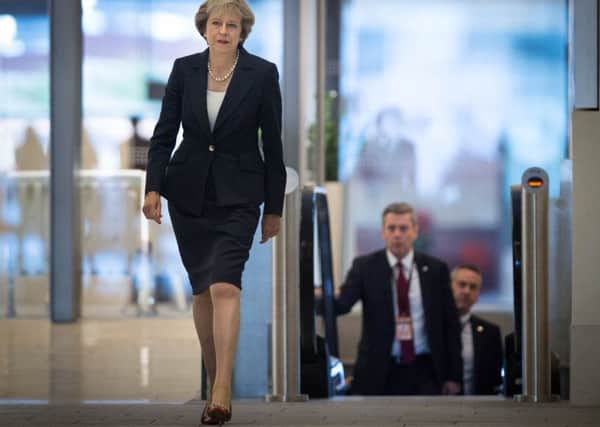Tom Richmond: A methodical Theresa May puts stability first as she steers nation's course


For some, Margaret Thatcher was too bossy; John Major too weak; Tony Blair too messianic; Gordon Brown too dysfunctional and David Cameron too inconsistent.
Now it is said that the methodical Mrs May is too cautious – and too controlling.
Really?
Advertisement
Hide AdAdvertisement
Hide AdAfter nearly two decades of ‘make it up as you go along’ politics by telegenic leaders who led by soundbite, I, for one, am reassured that the era of chillaxing sofa government is over and old-fashioned Cabinet discussion has returned.
What is wrong, as details emerge of the new Prime Minister’s more traditional style of leadership, with Mrs May being a hands-on premier who chairs the three key Cabinet committees on Brexit, industrial strategy and social reform? It would be newsworthy if the Tory leader did not.
What is wrong with a Prime Minister who likes to gather the evidence, as with Chinese investment in the new Hinkley Point nuclear power station, before taking a decision? Governing by instinct, as her critics advocate, can be fallible. Details do matter. Remember Iraq.
And what is wrong with Mrs May choosing not to provide a running commentary on Brexit just to satisfy the insatiable 24/7 commentariat? Her priority must be to build a serious and substantive strategy on an issue which will have far-reaching consequences for every family and all future generations, hence why Article 50 may not be triggered until next March.
Advertisement
Hide AdAdvertisement
Hide AdHere’s the context. Politicians, pundits and the public became impatient in 2010 when it took five days to form the Tory / Lib Dem coalition. Now it falls to the new Tory leader to repeal the 1972 European Communities Act and then allow Parliament to decide which EU legislation to retain or scrap. This is not going to happen overnight – and it is imperative that the Government finds the best way possible of upholding the will of the people without compromising this country’s hard-earned status as the world’s fifth largest economy.
By re-introducing some structure and order to Downing Street, Mrs May is also demonstrating the standards that she expects her Ministers to uphold – standards that saw her emerge with an enhanced reputation after six years at the Home Office. In short, she’s providing the stability that this country needs and putting the national interest before short-term political calculations with her refusal to call a snap general election.
And, in many respects, the intrigue surrounding Mrs May’s modus operandi and the loyalty of her closest confidantes who have not fed the media any tittle-tattle, is overshadowing the revival of compassionate conservatism as the Tories move to the political centre ground.
This is not immediately obvious because of the toxicity that still surrounds the possible reintroduction of selective education – a controversy which could have been avoided if the Government had said that it would look favourably at new academies intending to offer a grammar school ‘ethos’.
Advertisement
Hide AdAdvertisement
Hide AdNow Ministers face a protracted Parliamentary battle that might not be worth the time and effort – this is only likely to apply to a handful of new grammars – while also actually the impossible and uniting Jeremy Corbyn’s divided Labour Party on one issue.
An example of what happens when Prime Ministers are rushed into policy pronouncements, it does, however, show that Ministers accept the argument that the issue of skills has never been more important – and the Government must ensure that there are sufficient teachers to ensure that children receive the world-class education to which they should be entitled. Yet, grammar schools aside, the meritocratic Mrs May intends to be far more of a One Nation leader than her predecessor.
She’s conceded that it will be unwise to eradicate the deficit by the end of this Parliament because the consequences of Brexit are still unclear while also accepting that some EU laws, such as workers’ rights and health and safety legislation, should be retained.
She’s relaxing the rules on return-to-work repeat medical checks for disabled people with degenerative diseases like MS – one of many reasons why George Osborne had lost the moral authority to remain as Chancellor. Don’t forget that multiple sclerosis claimed Mrs May’s mother at a young age.
Advertisement
Hide AdAdvertisement
Hide AdAnd, in a new era of consumerism when it comes to the utilities and workers’ rights, she wants, for example, employees serving on company boards and having a say on corporate pay. Even the doomsayer Vince Cable, the former Lib Dem Business Secretary, has given his blessing.
Far from being a radical right-wing agenda that will divide society, Theresa May’s desire for a “small, strong and strategic government” suggests the outlook of this vicar’s daughter is far more suburban than the metropolitanism of Tony Blair and David Cameron.
Indeed, it is a relief when the new Prime Minister says: “I’m not going to be like ‘X’. I just look at the issues that I’m faced with and get on and do what I believe to be the right thing.” This is what the country expects and demands.